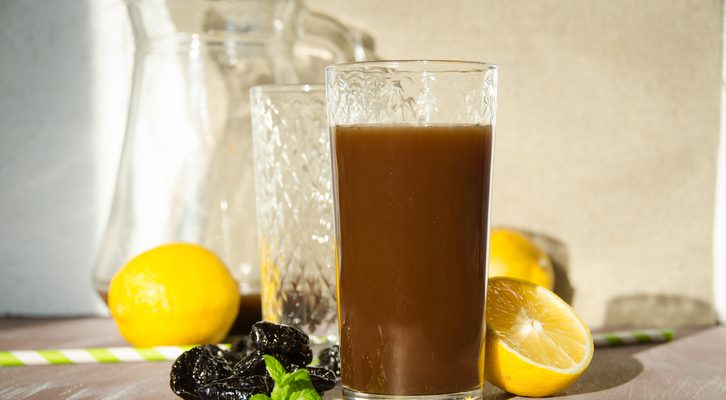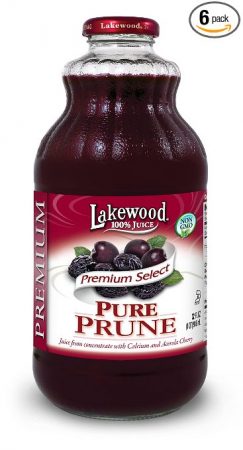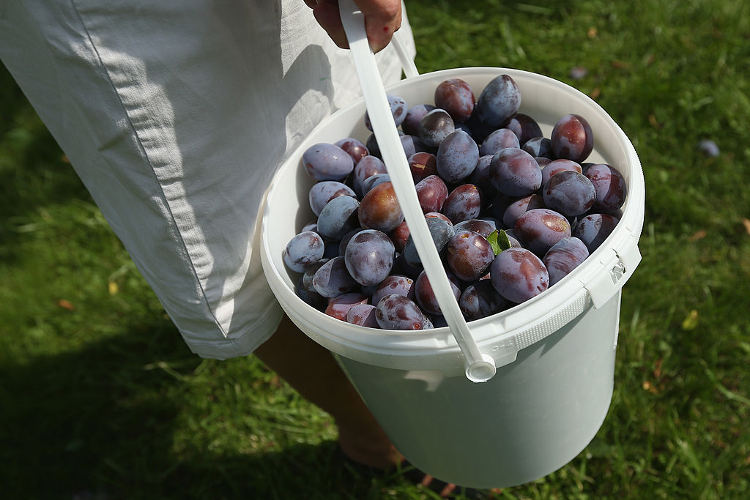
It is terrible to feel as if you have to use the washroom, and yet nothing comes out. If you’re having a problem with regular bowel movements, prune juice for constipation may be the solution.
In a healthy body, waste travels through the digestive tract within six to 24 hours. When it passes through the large intestine too slowly, this is called constipation.
Constipation among the elderly is especially prevalent. In fact, constipation affects 50% of community-dwelling older adults, and 74% of those living in a nursing home.
A healthy person has one to three bowel movements each day, but if your bowels are constipated, you likely haven’t passed a stool in two to three days.
Also, when your bowels are constipated, it is not just difficult to pass stools; the urge to pass waste may disappear altogether. Sometimes constipation has no signs, but at other times you may pass painfully hard stools, experience a general feeling of malaise, or have a distended abdomen.
Although constipation is the top gastrointestinal disorder in the U.S., it is actually quite easy to avoid. Stress, inactivity, and certain medications all contribute to the problem.
That said, the best treatment for constipation is increasing your fiber and fluid intake. When fluids and fiber are lacking, the large intestine lacks regular stimulation to generate contracting motions, and waste cannot be propelled through the intestinal tract.
Luckily, prune juice kills two birds with stone. It is a liquid and high in fiber. Let me explain why many top doctors recommend prune juice for constipation, how much to drink for constipation, and much more…
Why Prune Juice for Constipation?
Prunes, aka dried plums, and prune juice are amazing sources of fiber that can keep you regular. Although they are best known for their laxative effect, they also have antioxidant, anti-cancer, anti-hypertensive, anti-hyperglycemic, anti-hyperlipidemic, anti-osteoporosis, and hepatoprotective effects. As a result, prune juice can help treat colon cancer, prevent heart disease, protect against liver disease, strengthen your bones, and reduce oxidative stress in the body.
Who would have thought that prune juice could do all that? There is even evidence to support a prune juice laxative effect.
Studies Say Prune Juice Is Laxative
1. Prune Supplements Can Soften Stools
A study published in the Korean Journal of Community Nutrition in 2008 found that prune supplementation is effective for energy, fiber, and water, which helps relieve constipation symptoms in adults.
The prune supplementation softened the stools and decreased the pain and length of time involved in a bowel movement.
2. Prunes Increase Frequency of Bowel Movements
Also, a review published in the journal Alimentary Pharmacology & Therapeutics in 2014 found that prunes were more effective than high-fiber psyllium husk for constipation treatment.
The authors of the study noted that prunes increased the frequency of bowel movements and improved stool consistency in those with constipation.
3. Prune Juice Is More Effective Than Medicinal Laxatives
In 1980, a geriatric center in New Jersey even found that they could almost completely eliminate pharmaceutical laxatives by using sources of dietary fiber, including prune juice. The center even saved $44,000 in pharmaceutical expenses that year.
How does prune juice work and keep you so regular? Why is it considered good for your health?
5 Nutrients That Make Prunes the Best Remedy for Constipation:
1. Soluble Fiber
Soluble fiber improves the digestive system by stimulating peristalsis, which is a movement of the intestinal muscles that moves food through the digestive tract. Soluble fiber breaks down the blockages that cause constipation by absorbing water.
2. Non-Soluble Fiber (Insoluble Fiber)
The insoluble fiber in prunes fuels the probiotics, or good bacteria, in the digestive system. The good bacteria must exist in large amounts within the gut to maintain a healthy digestive tract.
3. Sorbitol
Why else are prunes for constipation so helpful? Prunes contain 15% sorbitol, which helps to soften and loosen stools by drawing lost water content back into the colon.
4. Dihydrophenylisatin
Dihydrophenylisatin is a chemical substance found in prunes’ skin. It powerfully stimulates intestinal movement. This increases fluid secretion to help soften stools.
5. Active Digestive Enzymes
Many of the minerals and vitamins in prunes like potassium and vitamin A help activate the digestive enzymes.
This helps stools move quickly through the colon and rectum. The potassium also draws back lost water and strengthens the colon against harmful bacteria in the digestive tract.
Lakewood Prune Juice- Enriched With Fiber
Prune Juice Nutritional Content
Funny enough, plums and prunes are actually the same fruit; however, farmers refer to certain plums as prunes when they are cultivated specifically to be dried. So, that’s why the more official term for prunes is dried plum.
Besides 2.6 g of fiber, one cup of prune juice contains:
- 44.7 g of carbs
- 1.6 g of protein
- 0.1 g of fat
- 0.6 mg of vitamin B6
- 707 mg of potassium
- 0.4 mg of manganese
- 3 mg of iron
- 10.5 mg of vitamin C
- 8.7 mcg of vitamin K
- 0.2 mg of vitamin B2
- 2 mg of vitamin B3
- 35.8 mg of magnesium
- 0.2 mg of copper
- 64 mg of phosphorus
- 0.5 mg of zinc.
How Much Prune Juice Should I Drink for Constipation?
How Much Prune Juice for Adults?
Adults should take four to eight ounces of prune juice each morning to ensure proper colonic stimulation. When you haven’t expelled a stool in a few days, you should drink up to three glasses daily.
Also, drinking a glass of water before consumption increases its effectiveness. A glass of heated prune juice in the morning will encourage a bowel movement in the evening, while a glass of warm prune juice before bed will help you go in the morning.
How Much Prune Juice for Infants?
When treating a baby or small child with constipation, two to four ounces is recommended, but two ounces per day should be enough. If the child doesn’t like it, try prune juice popsicles!
How Long Does Prune Juice Take to Work?
Because prune juice is high in natural sugar, it’s best that you purchase juice without added sugar. Better yet, you can easily make prune juice yourself using one cup of dried prunes and five cups of water.
Remove the stones from the prunes and boil five cups of water. Add some boiled water to a heat-safe container with the prunes. Fill the container until the prunes are submerged, set aside the rest of the boiled water for later use, and let the prunes soak for 12 to 24 hours.
Blend the prunes and the water you soaked them in until smooth. Using a sieve, push the mixture into a one-liter container, and get rid of the solid pieces. Use the remaining water to fill the container till you have a full liter, stir, and chill the juice in the fridge for up to a week.
How long does it take for prune juice to work? They work differently for certain people. For some it works in a few minutes, and for others it takes 30 minutes to an hour.
However, it is always best to wait at least a few hours after consuming prune juice for natural constipation relief before you start panicking that you haven’t had a bowel movement yet.
If you still haven’t had a bowel movement after several hours, try drinking warm distilled water as well.
Conclusion: How to Juice Prunes
You can choose prunes or prune juice to help treat constipation. However, the fiber in prunes may cause gas and bloating. As a result, it may be best to go with prune juice. It is also better to go with juice without added pulp, which also can lead to bloating.
Also, follow these tips for a better bowel movement:
- Exercise stimulates intestinal contractions, and even a brisk 30-minute walk is enough to get your bowels moving.
- Drink eight to 10 glasses of water per day. Water is a must since dehydration can lead to constipation.
- Never hold back. When you do, you are actually training your bowels not to expel waste, and the result is chronic constipation.
- Retrain your bowels by sitting on the toilet at the same time each day, even if you don’t feel the urge to go. After exercise or early in the morning are good times.
- Use a stool or squatty potty. This helps put you in the correct position to move all the waste smoothly through your digestive tract.
Enjoy your prune juice, and happy pooping!
Disclaimer: “We hope you love the products we recommend! Just so you know, Foods 4 Better Health may collect a small share of sales from the links on this page.”
Related:
- Complete List of Juices for Constipation Relief
- Does Peanut Butter Cause Constipation?
- Complete List of Fruits for Constipation Relief
- 10 Avocado Juice Benefits, Recipes and Possible Side Effects
- 10 Benefits of Pomegranate Juice
- What Makes Olive Oil Good for Constipation?
Sources:
Balch, J., et al., Prescription for Natural Cures: A Self-Care Guide for Treating Health Problems with Natural Remedies Including Diet, Nutrition, Supplements, and Other Holistic Methods (Hoboken: John Wiley & Sons, Inc., 2004), 211-216.
Johnson, J., “Prune Juice: Health Benefits and Nutritional Information,” Medical News Today web site, January 20, 2017; http://www.medicalnewstoday.com/articles/315340.php.















